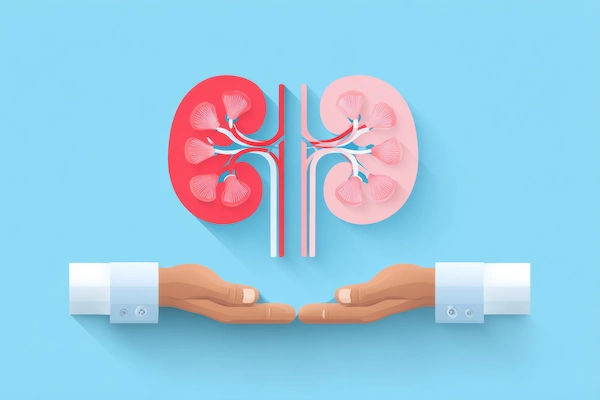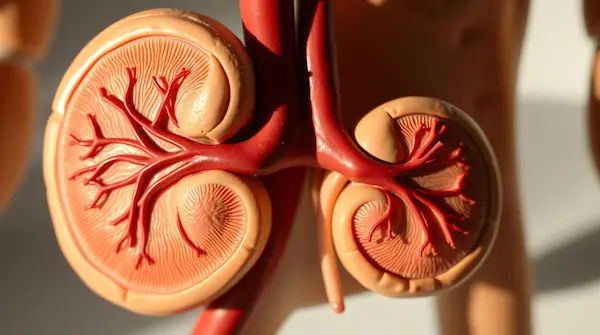Inherited Kidney Diseases: A Comprehensive Guide
Discover the causes, types, symptoms, and management of inherited kidney diseases in this comprehensive guide to better understand genetic kidney conditions.

Written by Dr. Rohinipriyanka Pondugula
Reviewed by Dr. Shaik Abdul Kalam MD (Physician)
Last updated on 13th Jan, 2026

Introduction
Your kidneys are incredible filtration systems, vital for your overall health. But what happens when a genetic blueprint passed down through your family affects their function? Inherited kidney diseases are a group of disorders caused by gene mutations that can significantly impact kidney health, often leading to chronic kidney disease or failure. Understanding these conditions is the first step toward proactive management and care. This guide will demystify the most common inherited kidney diseases, from the well-known Polycystic Kidney Disease (PKD) to lesser-known conditions like Alport Syndrome. We'll explore their symptoms, walk you through the diagnostic process, and outline the latest treatment and management strategies to help you or your loved ones navigate this challenging journey with knowledge and confidence.
What Are Inherited Kidney Diseases?
Inherited kidney diseases are disorders that are passed down from one or both parents to their children through altered genes. These genetic mutations affect the structure or function of the kidneys, often leading to a gradual loss of function over time. Unlike kidney damage from diabetes or high blood pressure, these conditions are present from birth, though symptoms may not appear until later in life.
The Genetic Link to Kidney Health
Genes are the instruction manuals for our bodies. A single error or mutation in a gene responsible for kidney development or function can have cascading effects. These mutations can be inherited in different patterns: autosomal dominant (where only one copy of the mutated gene is needed to cause the disorder), autosomal recessive (where two copies are needed), or X-linked (where the mutation is on the X chromosome).
Why Understanding Your Family History is Crucial
If multiple blood relatives have had kidney failure, kidney cysts, or required dialysis, it strongly suggests an inherited kidney disease. Tracing your family's medical history is a powerful diagnostic tool. It allows doctors to identify patterns and recommend early screening for at-risk individuals, potentially delaying the onset of severe symptoms through preemptive care.
Consult a Nephrologist for the best advice
Common Types of Inherited Kidney Disorders
The different genetic conditions that affect the kidneys include:
Polycystic Kidney Disease (PKD)
PKD is the most common inherited kidney disease, characterised by the growth of numerous fluid-filled cysts in the kidneys. These cysts enlarge the kidneys, disrupt their architecture, and ultimately lead to kidney failure.
Autosomal Dominant PKD (ADPKD): This form accounts for about 90% of PKD cases. A child has a 50% chance of inheriting the disease if one parent has it. Symptoms like high blood pressure, back pain, and haematuria (blood in urine) typically develop between ages 30 and 50.
Autosomal Recessive PKD (ARPKD): This is a rarer and more severe form that manifests in infancy or childhood. It requires a mutated gene from both parents. ARPKD often causes serious lung and liver complications in addition to kidney problems.
Alport Syndrome
This condition is caused by mutations in genes that affect type IV collagen, a crucial structural component of the glomeruli (the kidneys' filtering units). It leads to proteinuria (protein in urine), haematuria, and progressive kidney failure. It often also affects hearing and vision.
Fabry Disease
A rare X-linked genetic disorder, Fabry disease results from the buildup of a particular type of fat in the body's cells. This accumulation damages the kidneys, heart, brain, and nervous system. Kidney involvement in Fabry disease is a major cause of morbidity.
Thin Basement Membrane Disease
This condition is characterised by thinning of the glomerular basement membrane. Its primary sign is persistent haematuria. For most, it's a benign condition with an excellent prognosis, but in some families, it can progress to more serious kidney impairment.
Recognising the Signs and Symptoms
The signs and symptoms of kidney disease include:
Early Warning Signs Often Missed
Early symptoms can be subtle and easily attributed to other issues. They include:
High blood pressure (hypertension)
Fatigue and general weakness
Swelling in the ankles, feet, or hands (oedema)
Frequent urination, especially at night
Symptoms of Progressive Kidney Disease
As function declines, symptoms become more pronounced:
Persistent puffiness around the eyes
Bloody or foamy urine
Pain in the back or side (where the kidneys are located)
Loss of appetite and nausea
Muscle cramps and itchy skin
If you experience persistent symptoms like these, especially with a family history of kidney problems, consult a doctor online with Apollo24|7 for further evaluation.
How Are Inherited Kidney Diseases Diagnosed?
Diagnosis is a multi-step process that paints a complete picture.
The Role of Genetic Testing and Counselling
Genetic testing for kidney failure risk can identify specific mutations. This is often paired with genetic counselling to help individuals understand the results, their implications for family planning, and the risks to other family members.
Imaging Tests: Ultrasounds and CT Scans
Imaging is a cornerstone for diagnosing conditions like PKD. A renal ultrasound is a non-invasive first step to detect cysts, enlargement, or structural abnormalities in the kidneys.
Urine and Blood Tests for Kidney Function
These tests are critical for assessing the current state of kidney health.
Urine Tests: Check for albumin (a type of protein) and blood.
Blood Tests: Measure creatinine and urea levels to calculate the estimated glomerular filtration rate (eGFR), the best indicator of kidney function.
Apollo24|7 offers convenient home collection for tests like serum creatinine and eGFR, making regular monitoring easier.
Get Your Health Assessed
Treatment and Management Strategies
While most inherited kidney diseases are not yet curable, their progression can be significantly slowed.
Slowing Disease Progression: Medications and Lifestyle
Blood Pressure Control: ACE inhibitors or ARBs are first-line drugs that lower blood pressure and reduce proteinuria, directly protecting the kidneys.
Dietary Changes: A diet low in sodium, protein, and sometimes potassium and phosphorus can reduce the kidneys' workload.
Stay Hydrated: Drinking plenty of water may help slow cyst growth in PKD by suppressing vasopressin, a hormone that promotes cyst development.
Managing Associated Symptoms and Complications
Treatment is holistic, addressing pain, anemia, bone disease, and electrolyte imbalances that accompany declining kidney function.
Renal Replacement Therapy: Dialysis and Transplant
When kidneys fail, dialysis (a machine that filters blood) or a kidney transplant becomes necessary. A transplant offers the best outcomes for quality of life and longevity.
Living with an Inherited Kidney Disease
Managing a genetic kidney condition requires lifestyle adjustments and proper care.
Diet and Nutrition for Kidney Health
Working with a renal dietitian is essential. They can create a personalised plan to manage your labs and maintain nutrition while easing the burden on your kidneys.
The Importance of Regular Monitoring
Consistent check-ups with a nephrologist are non-negotiable. Regular blood and urine tests track progression and allow for timely adjustments to your treatment plan.
Emotional and Psychological Support
A chronic diagnosis can be overwhelming. Seeking support from therapists, counsellors, or patient support groups (like the PKD Foundation) can provide crucial emotional relief and practical advice.
Genetic Counselling and Family Planning
Support and guidance can make navigating inherited risks easier.
What to Expect in Genetic Counselling
A genetic counsellor will map your family history, explain the inheritance pattern of your condition, discuss the risks of passing the disease to children, and help interpret complex genetic test results.
Options for Future Generations
For those concerned about passing on a genetic mutation, options like preimplantation genetic diagnosis (PGD) exist. PGD involves IVF, where embryos are screened for the genetic mutation before being implanted, allowing for the selection of unaffected embryos.
Conclusion
Understanding inherited kidney diseases empowers you to take an active role in your health journey. While a genetic diagnosis can feel daunting, modern medicine offers more tools than ever for management and care. From proactive monitoring and lifestyle adjustments to advanced treatments and genetic counselling, there is a clear path forward. Remember, you are not alone; a team of healthcare professionals, from nephrologists to dietitians, and support from communities can guide you every step of the way. If you have a family history of kidney disease, don't wait for symptoms to appear. Take action today by speaking with a healthcare provider to discuss screening options and create a personalised health plan.
Consult a Nephrologist for the best advice
Consult a Nephrologist for the best advice
Dr. Nikhil Rathi
Nephrologist
5 Years • MBBS, MD General Medicine, DNB Nephrology
Pune
Apollo Hospitals Pune, Pune

Dr. Vamsee Priya Marina
Nephrologist
13 Years • MBBS, MD (Internal Medicine), MD (Nephrology), Diplomate American Board of Internal Medicine
Hyderguda
Apollo Hospitals Hyderguda, Hyderguda
(50+ Patients)

Dr. Pranab Kumar Medhi
Nephrologist
20 Years • MBBS, MD(Medicine), IDCCM(Critical Care Medicine), DM(Nephrology)
Guwahati
Apollo Hospitals G S Road, Guwahati

Dr. Chaitanya Subhash Kulkarni
Nephrologist
8 Years • MD,DNB
Bhopal
Apollo Sage Hospitals, Bhopal
(25+ Patients)

Dr Santosh Kumar
Nephrologist
13 Years • MD (Internal Medicine) DNB (Nephrology), MRCP – Nephrology (UK)
Lucknow
Apollomedics Super Speciality Hospital, Lucknow
More articles from Kidney Disease
Frequently Asked Questions
1. Can inherited kidney diseases skip a generation?
Yes, depending on the inheritance pattern. Autosomal recessive diseases (like ARPKD) can appear to skip generations if only one carrier gene is passed down. The carrier is typically unaffected but can pass the gene to their children. Autosomal dominant diseases (like ADPKD) do not skip generations; an affected person has a 50% chance of passing it directly to each child.
2. What is the life expectancy for someone with polycystic kidney disease?
With modern treatment and management, many people with ADPKD live well into their 70s. Life expectancy has improved significantly due to better blood pressure control, new medications like tolvaptan that slow cyst growth, and renal replacement therapies. The rate of progression varies greatly from person to person.
3. Should my children be tested if I have an inherited kidney disease?
This is a personal decision best made in consultation with a genetic counsellor and nephrologist. For diseases that manifest in adulthood (like ADPKD), testing is usually delayed until the child is old enough to participate in the decision. For childhood-onset diseases, earlier testing may be recommended to monitor health closely.
4. Are there any new treatments on the horizon for PKD?
Yes, research is ongoing. The drug tolvaptan (Jinarc) is a first-of-its-kind treatment approved to slow kidney cyst growth in adults. Numerous clinical trials are investigating other promising drugs that target different signaling pathways involved in cyst formation and growth.
5. Is a kidney transplant a cure for inherited kidney disease?
A transplant replaces the function of the failed kidneys but does not correct the underlying genetic mutation. Therefore, it is considered a treatment, not a cure. However, the new kidney is not from someone with the same genetic mutation, so it should not develop the inherited disease.

_6.webp)



